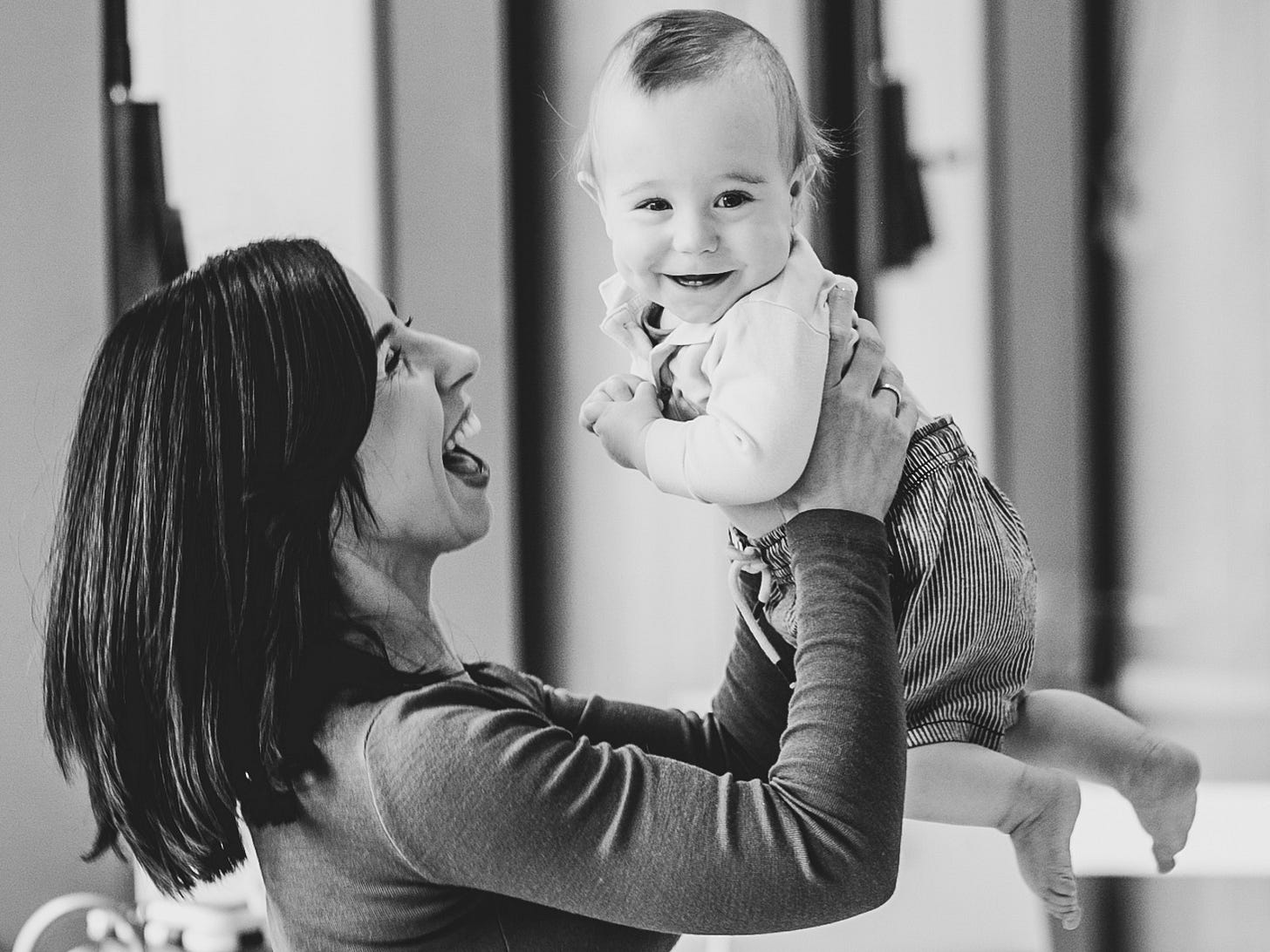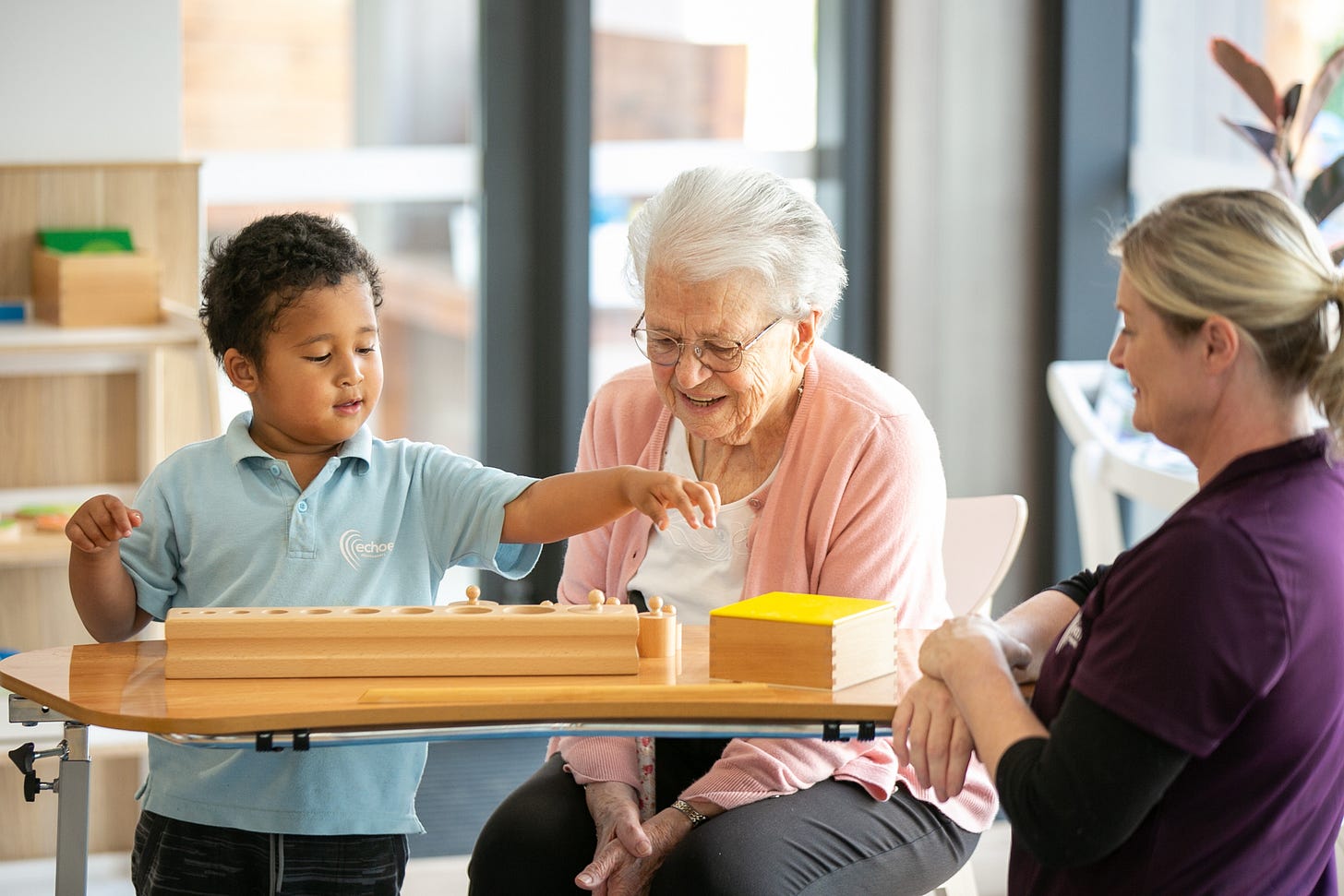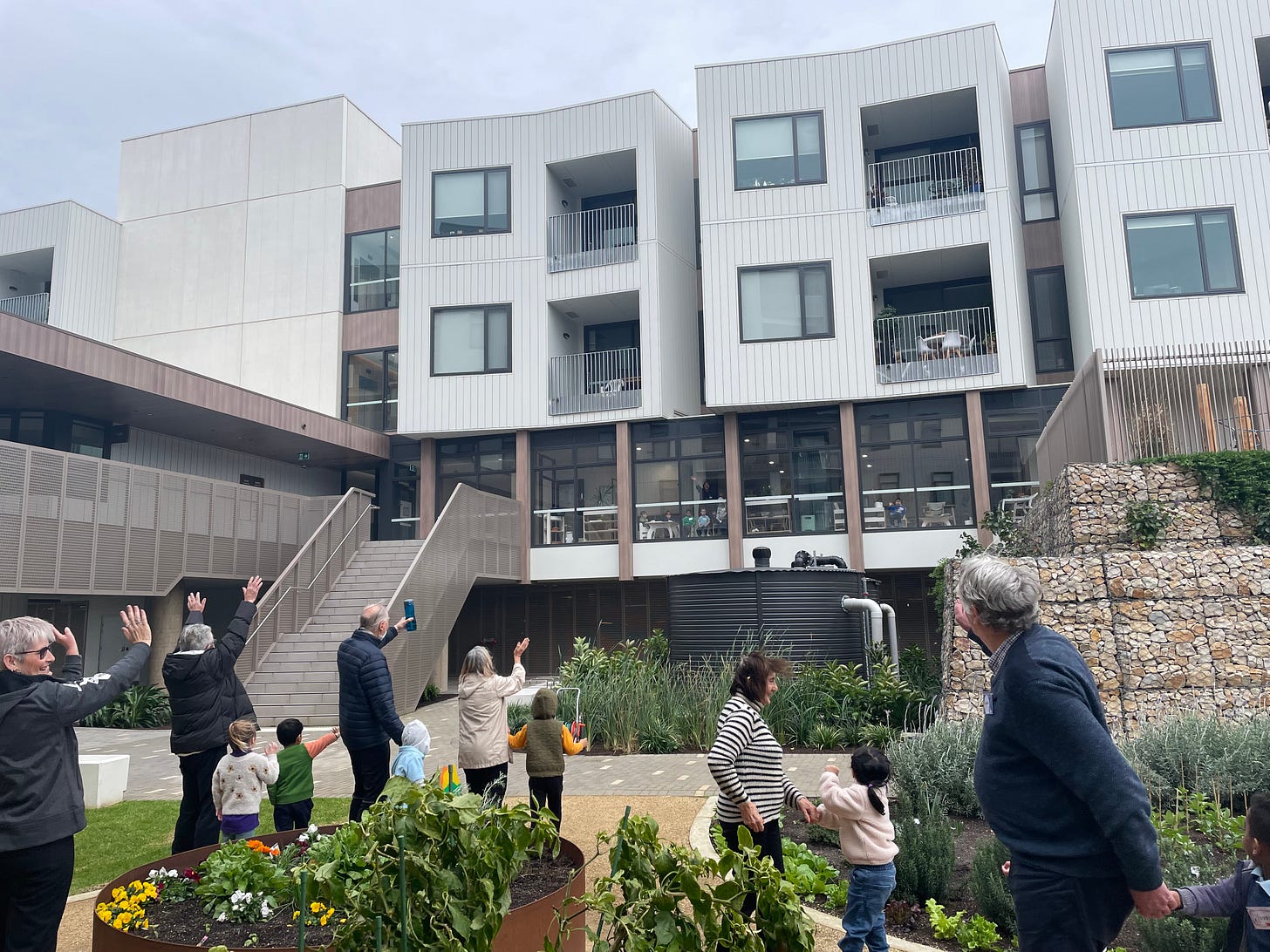Bridging the gap: finding purpose in intergenerational living
Jessica Langford: intergenerational practitioner - Adelaide, Australia
(Rather hear the full conversation? Here you go!)
“I’m one of the incredibly, incredibly privileged people who found a sense of purpose pretty early on in life,” says Jessica Langford. “I didn’t have to go looking for it. It just walked up to my door, knocked very loudly and said, ‘Here I am.’”
That was the moment six-month-old Emily arrived.
Love at first sight
“I feel like my purpose in life – the reason that I’ve been put on the earth, the thing that I’m supposed to do – is to identify unmet needs in people and help them to meet them.”
Jessica’s an intergenerational practitioner in South Australia. Running a Montessori school within a retirement living complex, she delivers tangible benefits to the communities she serves. But as a teenager she’d felt a little lost. “I was going through that typical adolescent stuff of trying to figure out not just, ‘Who am I?’ but ‘Who do I want to be?’ … looking for hedonistic pleasures and trying to fill the cup that way. And then into my life came a beautiful baby girl. Not my own – in fact, not biologically related to me at all.”
Until then, she’d been identifying unmet needs in more typical teenage ways, “at house parties, getting the drunk person a glass of water and a mattress to lie down on.” But then Emily arrived, “Suddenly, I had this new sense of purpose that took it to a whole other level.”
Brooke was Jessica’s brother’s girlfriend, and Emily was her daughter. The two of them moved into Jessica’s family home and something extraordinary happened, “I just fell in love,” she says. “I just adored this little girl from the moment I met her - it’s something I still can’t rationally explain.”
“As a culture, we put so much stock into romantic love, and we talk about love at first sight being this fireworks moment for a romantic partner. But I felt that in a familial sense with Emily. There was something in me that recognised something in her. And I just immediately felt, ‘Oh, I’m meant to be in your life, and you’re meant to be in mine.’”
A few years later, this reason became clear - when Brooke’s relationship broke down and she started to struggle with addiction.
A strong sense of mattering
Having formed such a strong bond with Emily, Jessica was adamant she didn’t want her to end up in foster care, “I suddenly had this ‘aha’ moment of, ‘She needs me. She’s got this massive unmet need and I can do something about it; I can step up and be there for her.’”
So, she became her kinship carer aged 19. “I think that was the first time I took that instinct I had for spotting unmet needs in people and applied it in a really purposeful sense.”
Feeling the pull of positive psychology
While Emily was opening Jessica’s eyes to the power of positive relationships and “the wonder of early childhood”, her psychology degree was leaving her cold. “This was the early 2000s, and the positive psychology movement hadn’t made its way onto the syllabus.” She recalls how the focus back then was on identifying deficits, rather than promoting flourishing, “It was, ‘Let’s diagnose everybody. Let’s put them into some diagnostic categories.’ That’s a really satisfying way to live,” she grimaces.
Despite feeling disillusioned with the course, Emily had shown her an alternative path. Early education could be a form of preventative psychology, helping children “develop psychologically healthy landscapes from the beginning, so that whatever happens to them through the rest of life’s journey, they’ve got that toolkit.”
And as Jessica’s mother was a Montessori teacher, joining forces with her, “suddenly seemed like absolutely the right thing to do.” Plus, the approach perfectly aligned with her purpose, “Maria Montessori … was very much a scientist who engaged in observation of children and tried to identify what their needs were, how they were primed to learn, and what she could do to facilitate that.”
Noticing a generation of unmet needs
To equip her with the tools to help children in her care flourish, Jessica enrolled on a Diploma of Positive Psychology and Wellbeing. But she found herself applying the learnings in a way she hadn’t anticipated: to support her grandfather, as he cared for his wife with Alzheimer’s disease. “After she passed, I watched my granddad lose his purpose. It almost felt like he shrunk physically. Not only was the love of his life no longer there, but his reason to get up in the morning was gone too.”
He moved in with Jessica’s parents for his final years, and this opened her eyes to unmet needs – not just her grandfather’s, but potentially his whole generation’s. “It got me thinking: what does his everyday look like? And how many people his age are out there who don’t have someone coming home in the afternoon … who don’t have that sense of connection?”
Jessica and her mother started to talk very seriously about the intersection between all these elements. “How do we take what we know about early childhood, about Montessori and how beautifully it prepares children for life … [and] … about positive psychology, positive ageing and wellbeing, and what people need to flourish?”
Serendipity steps in
Then, just as their own ideas for intergenerational practice were taking shape, “We happened to be introduced to the CEO of an organisation called ECH, which provides ageing support services here in South Australia.” It turns out they were thinking along the same lines. “It was a coffee shop conversation that then turned into, ‘Okay, let’s do this – let’s design this and make it a reality.’”
What they created was revolutionary. Echoes Montessori is an early learning centre on the ground floor of a retirement village. With shared spaces designed for intergenerational connection, children from six months to primary school age can spend time with their 65-90+ year old ‘grandfriends’.
The magic in action
Some grandfriends love coming into the classroom. Others, like Rob, are a little less convinced – at least to start with. He thought interacting with the children would be his wife’s domain, not his. But one thing Rob’s really into is creating elaborate model train sets. “And of course, another group who are very passionate about trains is young children!” Having only ever had the odd “mmm hmmm” from his wife, he found a much more engaged audience in the classroom, with “children gathered around the table going, ‘That’s amazing! How does this work? Tell me what that does!’”
Grandfriends play a part in many aspects of the children’s day-to-day, from handcrafting learning materials in the workshop to caring for the communal gardens. And some experiences - like helping children develop their fine motor skills - offer more than just companionship. As we age, our ability to grip objects sometimes declines through lack of use; mentoring the children can help the grandfriends rediscover their own dexterity. “If you were doing it as an exercise on your own, you might feel a bit silly. But when you’re doing that with the children - when you’re helping them, mentoring them, guiding them - there’s dignity.”
Protection is paramount
But what about safeguarding? Jessica’s approach is deeply personal. Her first husband, Andrew, battled years of mental health issues stemming from childhood abuse – ultimately reaching the point where he couldn’t carry the weight any further.
“I’m looking at little Andrews,” she says. “I would never place a child in a position that I wouldn’t put someone I love - that I wouldn’t put myself [or] that I would ever think twice about.” Rather than avoiding risk, she sees intergenerational practice as protective: building children’s confidence with adults and expanding their support networks.
Love in the time of loss
The impact of her work is perhaps best illustrated through David’s story. His wife, a retired schoolteacher, was looking forward to spending time with children but passed away before the apartments were completed. So, David came into the classroom, “as a tribute to her, knowing that it’s what she would have done.” He used to be a Royal Air Force pilot, so taught the children to make paper planes, explaining the physics behind them and maintaining a core part of his identity in the process.
When he was diagnosed with terminal cancer, the community leaned in. With his permission, the children were given opportunities to “express their gratitude to him, and their friendship, and their love”. The full impact of David’s experience was only realised at his funeral. During the eulogy, “his daughter began to speak about Echoes and how much the children had meant to him, and we were floored.” They discovered quite how much they’d enriched his final years, “It really hit home. This was an important part of his life - it doesn’t matter that it was brief or towards the end.” Ultimately, “it gave him purpose. He had a purpose in life at a time where so many people are robbed of it by circumstance.”
We didn’t come here to **** spiders
But living your purpose isn’t always easy. Sometimes you have to make hard choices. As Jessica discovered, when the opening of the centre coincided with her son being born 13 weeks prematurely, in the midst of a pandemic. “I had my beautiful little boy literally attached to my boob most of the time” while “on a construction site, putting furniture together and doing all the promotional stuff.”
Downing tools wasn’t an option, “I didn’t come here to **** spiders!”, she laughs (loving the perfect opportunity to smash out some quintessentially Australian slang). Jessica said she could, “either just put [the construction] on the back burner and miss out, or I can pull my sleeves up and make it work.” So she chose to make everything come together in a way that felt authentic to her - with her son an important part of the process.
When The Office says it best
Has Jessica found her purpose? “I think I’ll be here for a long time, but I also don’t think it’s the end of the journey”. Describing purpose as, “meaning in application”, she’s driven by prosocial motivation: positively contributing to others’ wellbeing by finding ways to translate things that bring meaning into her life, “into something that has an impact on the world.”
Her advice for finding your own purpose is simple, “Listen. Listen to yourself. Listen to that little voice in your head telling you that ‘this matters’, that ‘you can do it’, that you can try. Listen to the people around you. Listen to what people need - because that might take you where you need to go.” And if the voice is telling you to step off the expected path, perhaps don’t ignore it. She signs off with a quote from The Office, when Tim tells Dawn, “It’s better to be at the bottom of a ladder you want to climb than halfway up one you don’t.” And Jessica’s proof this works.
To find out more or get in touch with Jessica, visit montessoriforlife.com.au, search for @echoesmontessori on socials, or connect with her on LinkedIn.
Uncut and unfiltered: the full conversation
It’s worth listening to this simply to marvel at Jessica’s naturally poetic turn of phrase! You’ll also learn far more about the inspiring yet often heart-wrenching path she’s navigated over the past few decades, how positive psychology has given her the tools to deal with life’s unexpected challenges, and why we don’t always want to be the loudest voice in the room.
She’s made of strong stuff, and she’s also very funny.
Please note: there is a small amount of uncensored language in this recording, as well as references to child abuse and suicide.



